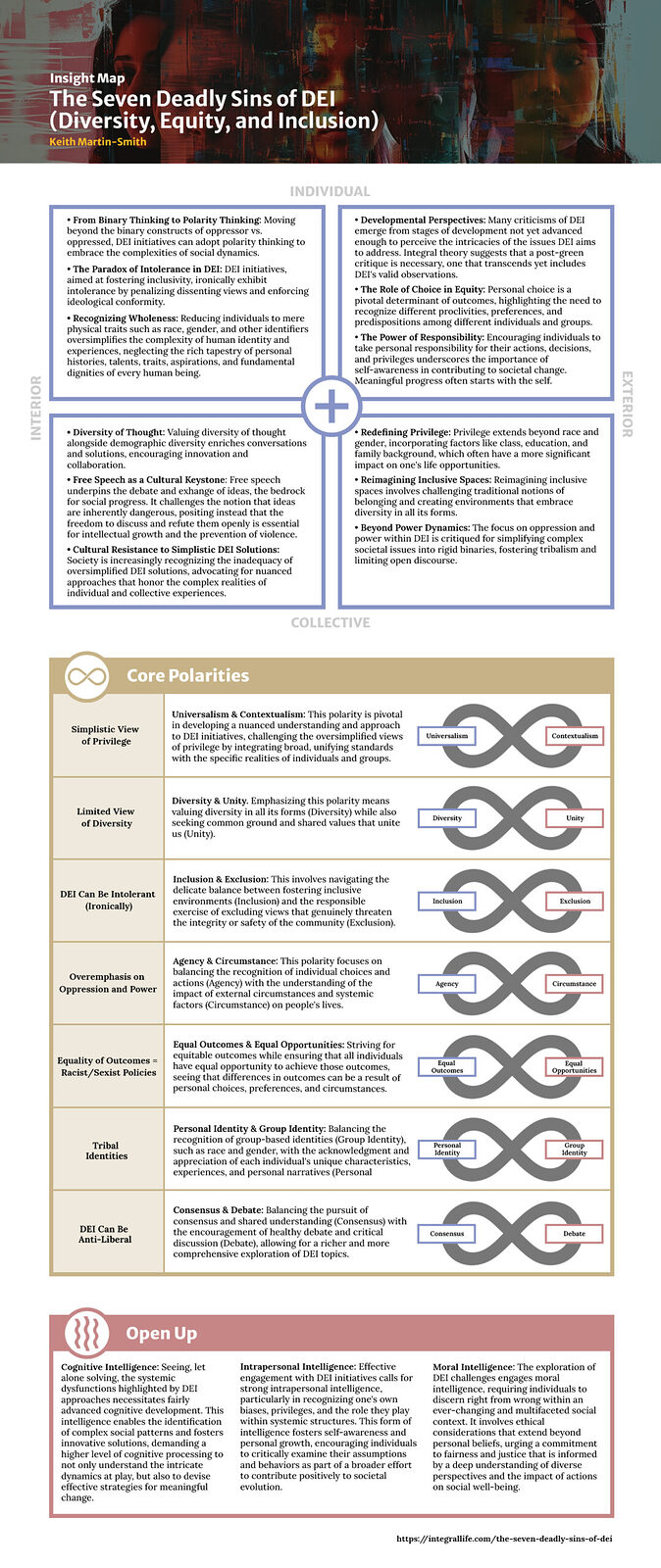An intelligent analysis, firmly and kindly differentiating an Integral take on the issue from our pre-integral (pluralistic, green stage/pomo influenced) friends’ take on it. Much appreciated.
Yes, our pre-integral friends often do ‘miss the mark’ (the original meaning of “sin”), as does so much of the world in so many areas. Lacking in both the penetrative, zoom-in kind of consciousness as well as the expansive zoom-out consciousness we might desire or covet, they simply don’t see enough. And yet, their somewhat amorphous grand intuitive awareness leads them to an assertion of humanity, humaneness, as limited or imperfect as it may be, and that is a step in the right direction, in my opinion, and that applies to DEI, as limited and imperfect as it may currently be.
Personally, I find it encouraging (given that 50-60% of people in the US are at the amber stage or below) that half or more of both men and women say that focusing on increasing DEI at work is a “good thing” (Pew Research, May 2023). More women (61%) say this than men (50%), which reflects polls and data showing there is a widening gap between men and women when it comes to liberalism. (Incidentally, according to Pew, men are more than twice as likely as women to say it’s a “bad thing.” Obviously, there are lots of reasons for this.)
Predictably, people of color are more favorable towards DEI than white people. Younger workers (68% of the under age 30) are quite favorable towards it, and the more educated the person, the more favorably DEI is viewed. And of course, there are the partisan divides: 78% of Democrats and D-leaning folks view it positively, as compared to 30% of Republicans or the R-leaning. Only 4% of Dems or D-leaning view it as a “bad thing” as compared to 30% of Republics or R-leaning people.
Of the people who view DEI unfavorably or think it’s a bad thing, some of that is undoubtedly due to one or more of these “seven sins.” And given the current socio-political culture, what we see with our own eyes, I think it’s hard to deny that the usual “isms” play a role here too, and would point out and reiterate that we do after all have a white nationalism movement in our midst, and a presidential candidate found liable for sexual assault (with some two dozen other women having alleged sexual abuse or inappropriate non-consensual by him). So we are definitely not done with race or sex/gender lessons.
Pew focused on gender, race, sexual orientation, age, and physical disability in its research. I agree that there are more DEI elements that need to be brought to the table: religion for one, as well as other influential factors Keith mentioned–e.g. class, education, perspective–if we want a more holistic framing. Salary transparency might be another one. DEI itself though follows a long line of workplace policies and practices and labor initiatives in general that, in my opinion, have had a positive influence in the world, everything from child labor laws (now being dismantled in numerous states, often to take advantage of the cheap labor of teen undocumented migrants), workers’ compensation insurance, labor unions, and sexual harassment laws and training in the workplace, to name a few.
And again, none of what I’m saying is to refute or disagree with the 7 sins outlined here; I don’t disagree. But as far as oppression goes, I do think there is a spectrum of oppression, that has to do with such things as stages of both individual and cultural development, how a culture (or workplace) organizes itself, and many other things. I think of how many in Western culture celebrated or positively acknowledged such things as the Chinese protests at Tiananmen Square, or the Arab Spring protests, or Hong Kong, or women resisting/protesting head coverings in Iran, or Israelis protesting the stripping of power from the judiciary. It seemed clear to many of us that these were uprisings against oppression by dictatorial states, many of them at orange-ish/amber or below stages of development.
Here in the US, I think that while the outcry against it can be quite loud, oppression itself is more subtle, less obvious to the casual on-looker, whether that be forms of oppression in the workplace or oppression of a collective in society (e.g. unaffordable housing costs, child poverty, etc.). I think of a scene from the pink visual extravaganza that was “Barbie” in which the wannabe patriarch Ken in the Real World asks a suited man “where’s the patriarchy?” The man replies “oh we got rid of that.” Ken was obviously disappointed. The man smiled and said, “well we still have it but we just hide it better.”
I feel similarly towards DEI as-is as I did the Barbie movie. Both are heavy on message and somewhat overbearing, but I am really glad that younger people are being exposed to such thinking. And it’s heartening to think that there are Integralists raising their children to be integral thinkers. The future could be good.
